-
 Bitcoin
Bitcoin $83,389.0021
-2.66% -
 Ethereum
Ethereum $1,569.2797
-4.59% -
 Tether USDt
Tether USDt $0.9999
0.01% -
 XRP
XRP $2.0509
-4.63% -
 BNB
BNB $578.6020
-1.83% -
 Solana
Solana $125.0106
-4.93% -
 USDC
USDC $0.9999
0.00% -
 TRON
TRON $0.2528
0.57% -
 Dogecoin
Dogecoin $0.1530
-4.39% -
 Cardano
Cardano $0.6040
-6.34% -
 UNUS SED LEO
UNUS SED LEO $9.3933
-0.40% -
 Chainlink
Chainlink $12.1783
-4.38% -
 Avalanche
Avalanche $18.6507
-6.83% -
 Toncoin
Toncoin $2.8619
-3.40% -
 Stellar
Stellar $0.2318
-3.94% -
 Shiba Inu
Shiba Inu $0.0...01162
-2.87% -
 Sui
Sui $2.0869
-5.25% -
 Hedera
Hedera $0.1561
-6.23% -
 Bitcoin Cash
Bitcoin Cash $320.8376
-4.26% -
 Litecoin
Litecoin $75.7597
-3.25% -
 Polkadot
Polkadot $3.5215
-4.76% -
 Dai
Dai $1.0000
0.01% -
 Bitget Token
Bitget Token $4.2238
-2.82% -
 Hyperliquid
Hyperliquid $14.9267
-8.83% -
 Ethena USDe
Ethena USDe $0.9991
0.01% -
 Pi
Pi $0.6140
-17.38% -
 Monero
Monero $217.1639
2.20% -
 Uniswap
Uniswap $5.1364
-5.21% -
 OKB
OKB $52.2432
-0.09% -
 Pepe
Pepe $0.0...07048
-5.20%
How to choose a suitable cryptocurrency for mining?
When choosing a cryptocurrency to mine, consider market value, mining difficulty, hardware costs, energy efficiency, and regulatory compliance for optimal profitability.
Apr 16, 2025 at 10:15 am

Choosing a suitable cryptocurrency for mining involves several considerations that can impact your profitability and efficiency. Mining cryptocurrencies can be a rewarding venture, but it requires careful planning and research. In this article, we will explore the key factors to consider when selecting a cryptocurrency for mining, ensuring you make an informed decision.
Understanding the Basics of Cryptocurrency Mining
Before delving into the selection process, it's essential to understand what cryptocurrency mining entails. Mining is the process by which transactions are verified and added to the blockchain, a public ledger of all cryptocurrency transactions. Miners use powerful computers to solve complex mathematical problems, and in return, they are rewarded with cryptocurrency. The profitability of mining depends on several factors, including the cryptocurrency's market value, the cost of electricity, and the efficiency of the mining hardware.
Evaluating the Cryptocurrency's Market Value
One of the primary considerations when choosing a cryptocurrency for mining is its market value. The value of the cryptocurrency you mine directly affects your potential earnings. To evaluate this, you should:
- Monitor the price trends of the cryptocurrency over time. Look for cryptocurrencies that have a stable or increasing value, as this will maximize your returns.
- Compare the market capitalization of different cryptocurrencies. A higher market cap often indicates greater stability and liquidity, which can be advantageous for miners.
- Stay informed about upcoming events such as halvings or major updates that could impact the cryptocurrency's value. For example, Bitcoin's halving events historically lead to price increases due to reduced supply.
Assessing the Mining Difficulty and Network Hash Rate
The mining difficulty and network hash rate are crucial factors that determine how challenging it is to mine a particular cryptocurrency. Mining difficulty is adjusted periodically to maintain a consistent block time, and a higher difficulty means more computational power is required to mine successfully. The network hash rate represents the total computational power of all miners on the network. To assess these factors:
- Check the current mining difficulty for the cryptocurrency you are considering. A lower difficulty can make mining more profitable, especially for those with less powerful hardware.
- Monitor the network hash rate. A high hash rate indicates a competitive mining environment, which may reduce your chances of earning rewards.
- Use mining calculators to estimate your potential earnings based on the current difficulty and hash rate. These tools can help you determine if mining a particular cryptocurrency is viable for your setup.
Considering the Mining Hardware and Energy Costs
The choice of mining hardware and the associated energy costs are critical to your mining operation's success. Different cryptocurrencies may require different types of hardware, such as ASICs (Application-Specific Integrated Circuits) or GPUs (Graphics Processing Units). To make an informed decision:
- Research the hardware requirements for the cryptocurrency you want to mine. Some cryptocurrencies, like Bitcoin, are best mined with ASICs, while others, like Ethereum, can be mined with GPUs.
- Calculate the cost of the hardware and compare it to your expected earnings. Ensure that the initial investment in hardware can be recouped within a reasonable timeframe.
- Evaluate the energy consumption of your mining setup. High electricity costs can significantly impact your profitability, so consider the efficiency of your hardware and the local electricity rates.
- Look for energy-efficient mining solutions, such as using renewable energy sources or participating in mining pools that offer lower energy costs.
Analyzing the Cryptocurrency's Block Reward and Transaction Fees
The block reward and transaction fees are the primary sources of income for miners. The block reward is the amount of cryptocurrency awarded to the miner who successfully adds a new block to the blockchain. Transaction fees are additional payments made by users to prioritize their transactions. When evaluating these factors:
- Check the current block reward for the cryptocurrency. A higher block reward can lead to greater earnings, but it's essential to consider how the reward changes over time. Some cryptocurrencies, like Bitcoin, have a halving mechanism that reduces the block reward periodically.
- Assess the average transaction fees on the network. Cryptocurrencies with higher transaction volumes and fees can provide additional income for miners.
- Consider the total potential earnings from both block rewards and transaction fees. Use mining calculators to estimate your earnings based on these factors.
Exploring Mining Pools and Solo Mining Options
Deciding whether to join a mining pool or mine solo is another important consideration. Mining pools allow miners to combine their computational power to increase their chances of earning rewards, which are then distributed among the participants. Solo mining involves mining independently, which can be more challenging but also potentially more rewarding. To make the best choice:
- Evaluate the benefits of mining pools. Joining a pool can provide more consistent earnings, especially for those with less powerful hardware. Research different pools and compare their fees and payout structures.
- Consider the advantages of solo mining. If you have powerful hardware and are willing to take on more risk, solo mining can result in higher individual rewards. However, it requires more patience and a higher initial investment.
- Assess the reliability and reputation of the mining pool you are considering. Choose a pool with a proven track record and transparent operations to ensure you receive your fair share of the rewards.
Staying Informed About Regulatory and Legal Considerations
Finally, it's crucial to stay informed about regulatory and legal considerations related to cryptocurrency mining in your jurisdiction. Different countries have varying regulations regarding cryptocurrency, and non-compliance can lead to legal issues. To ensure you operate within the law:
- Research the legal status of cryptocurrency mining in your country. Some regions may have specific regulations or restrictions that you need to be aware of.
- Stay updated on any changes to cryptocurrency regulations. Governments and regulatory bodies may introduce new laws that impact mining operations, so it's essential to remain informed.
- Consult with a legal expert if you are unsure about the regulatory environment. They can provide guidance on compliance and help you navigate any legal challenges.
Frequently Asked Questions
Q: How can I determine the profitability of mining a specific cryptocurrency?
A: To determine the profitability of mining a specific cryptocurrency, you should use mining calculators that take into account factors such as the cryptocurrency's market value, mining difficulty, network hash rate, block reward, transaction fees, and your electricity costs. These calculators provide an estimate of your potential earnings based on your mining setup.
Q: What are the risks associated with cryptocurrency mining?
A: Cryptocurrency mining involves several risks, including the volatility of cryptocurrency prices, high electricity costs, potential hardware failures, and regulatory changes. Additionally, the mining difficulty and network hash rate can increase, reducing your chances of earning rewards. It's essential to thoroughly research and understand these risks before starting to mine.
Q: Can I mine multiple cryptocurrencies simultaneously?
A: Yes, it is possible to mine multiple cryptocurrencies simultaneously, depending on your hardware capabilities. Some mining software allows you to switch between different cryptocurrencies based on their profitability. However, managing multiple mining operations can be complex, and you should ensure that your hardware can handle the computational demands.
Q: How do I know if my mining hardware is compatible with a specific cryptocurrency?
A: To determine if your mining hardware is compatible with a specific cryptocurrency, you should research the hardware requirements for that cryptocurrency. Some cryptocurrencies require ASICs, while others can be mined with GPUs. Check the specifications of your hardware and compare them to the requirements listed on the cryptocurrency's official website or mining forums.
Disclaimer:info@kdj.com
The information provided is not trading advice. kdj.com does not assume any responsibility for any investments made based on the information provided in this article. Cryptocurrencies are highly volatile and it is highly recommended that you invest with caution after thorough research!
If you believe that the content used on this website infringes your copyright, please contact us immediately (info@kdj.com) and we will delete it promptly.
- XLM's immediate prospects look bleak, with its price chart flashing a "rising wedge" breakdown.
- 2025-04-16 15:20:12
- Shares Mostly Lower in Asia After Quiet Day on Wall Street
- 2025-04-16 15:20:12
- Ripple CEO Brad Garlinghouse Reveals the Company Is in Talks with the SEC to Settle Their Legal Dispute, Possibly with an XRP Payment
- 2025-04-16 15:15:13
- Solana (SOL) Price Targets $300 as SOL/ETH Ratio Hits All-Time Highs
- 2025-04-16 15:15:13
- XRP's Rebound: Eyes on a Significant Surge
- 2025-04-16 15:10:13
- The Ripple SEC case finally seems to come to an end
- 2025-04-16 15:10:13
Related knowledge
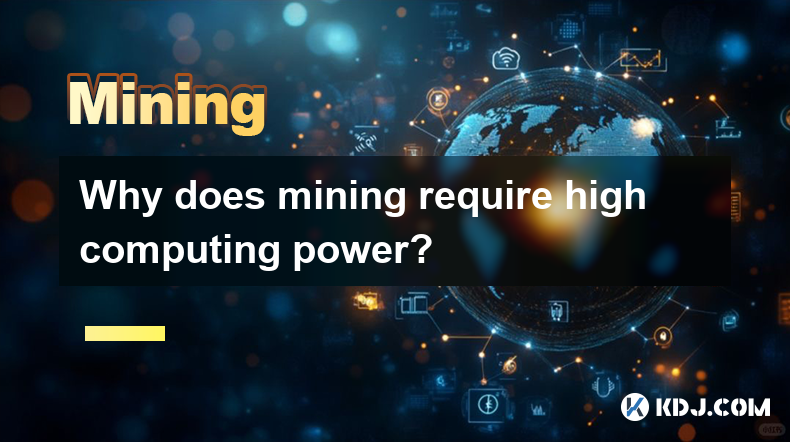
Why does mining require high computing power?
Apr 16,2025 at 12:07pm
Mining in the cryptocurrency world, particularly in the case of Bitcoin and other Proof of Work (PoW) cryptocurrencies, is a process that demands significant computational resources. This article delves into the reasons behind this high demand for computing power, exploring the technical intricacies and the underlying principles that necessitate such re...
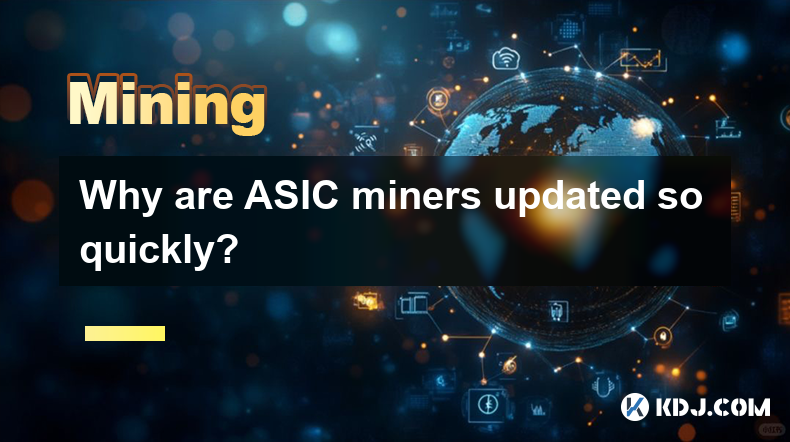
Why are ASIC miners updated so quickly?
Apr 16,2025 at 01:07pm
The rapid updates of ASIC miners in the cryptocurrency industry are driven by several key factors that contribute to their constant evolution and improvement. ASIC miners, or Application-Specific Integrated Circuit miners, are specialized hardware designed to mine specific cryptocurrencies with high efficiency. The primary reason for their frequent upda...
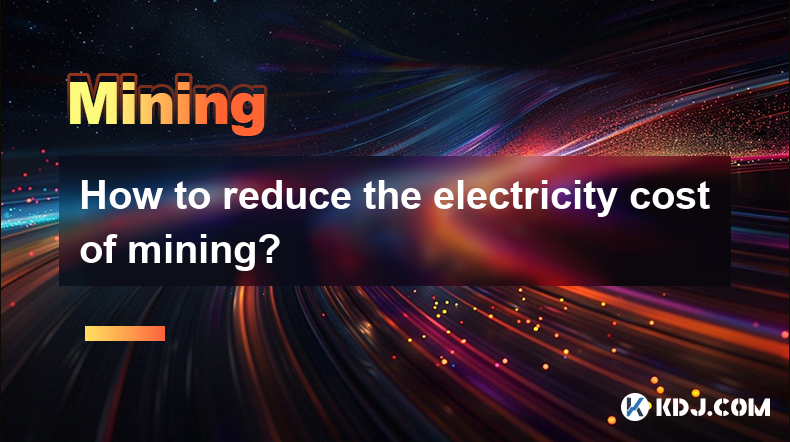
How to reduce the electricity cost of mining?
Apr 16,2025 at 08:42am
Mining cryptocurrencies, particularly Bitcoin, is an energy-intensive process that can lead to significant electricity costs. However, there are several strategies that miners can employ to reduce these expenses and make their operations more cost-effective. In this article, we will explore various methods to minimize the electricity cost of mining. Cho...
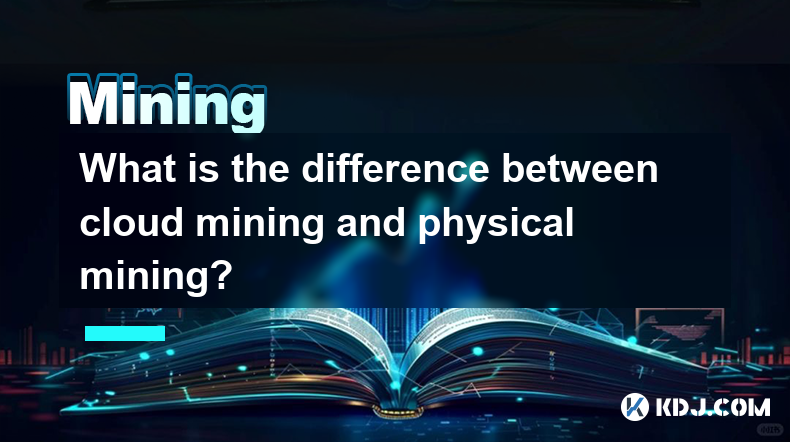
What is the difference between cloud mining and physical mining?
Apr 16,2025 at 01:49am
What is the difference between cloud mining and physical mining? In the world of cryptocurrencies, mining is the process by which new coins are generated and transactions are verified and added to the blockchain. There are two primary methods of mining: cloud mining and physical mining. Understanding the differences between these two approaches can help...
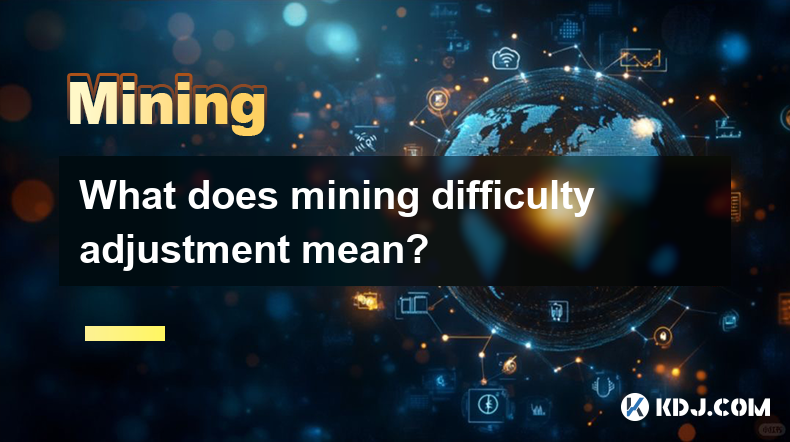
What does mining difficulty adjustment mean?
Apr 16,2025 at 12:42am
What does mining difficulty adjustment mean? Mining difficulty adjustment is a crucial mechanism in blockchain networks, particularly in Proof of Work (PoW) systems like Bitcoin. It ensures that the rate at which new blocks are added to the blockchain remains consistent, despite fluctuations in the total computational power (hash rate) of the network. T...

How to choose a suitable cryptocurrency for mining?
Apr 16,2025 at 10:15am
Choosing a suitable cryptocurrency for mining involves several considerations that can impact your profitability and efficiency. Mining cryptocurrencies can be a rewarding venture, but it requires careful planning and research. In this article, we will explore the key factors to consider when selecting a cryptocurrency for mining, ensuring you make an i...

Why does mining require high computing power?
Apr 16,2025 at 12:07pm
Mining in the cryptocurrency world, particularly in the case of Bitcoin and other Proof of Work (PoW) cryptocurrencies, is a process that demands significant computational resources. This article delves into the reasons behind this high demand for computing power, exploring the technical intricacies and the underlying principles that necessitate such re...

Why are ASIC miners updated so quickly?
Apr 16,2025 at 01:07pm
The rapid updates of ASIC miners in the cryptocurrency industry are driven by several key factors that contribute to their constant evolution and improvement. ASIC miners, or Application-Specific Integrated Circuit miners, are specialized hardware designed to mine specific cryptocurrencies with high efficiency. The primary reason for their frequent upda...

How to reduce the electricity cost of mining?
Apr 16,2025 at 08:42am
Mining cryptocurrencies, particularly Bitcoin, is an energy-intensive process that can lead to significant electricity costs. However, there are several strategies that miners can employ to reduce these expenses and make their operations more cost-effective. In this article, we will explore various methods to minimize the electricity cost of mining. Cho...

What is the difference between cloud mining and physical mining?
Apr 16,2025 at 01:49am
What is the difference between cloud mining and physical mining? In the world of cryptocurrencies, mining is the process by which new coins are generated and transactions are verified and added to the blockchain. There are two primary methods of mining: cloud mining and physical mining. Understanding the differences between these two approaches can help...

What does mining difficulty adjustment mean?
Apr 16,2025 at 12:42am
What does mining difficulty adjustment mean? Mining difficulty adjustment is a crucial mechanism in blockchain networks, particularly in Proof of Work (PoW) systems like Bitcoin. It ensures that the rate at which new blocks are added to the blockchain remains consistent, despite fluctuations in the total computational power (hash rate) of the network. T...

How to choose a suitable cryptocurrency for mining?
Apr 16,2025 at 10:15am
Choosing a suitable cryptocurrency for mining involves several considerations that can impact your profitability and efficiency. Mining cryptocurrencies can be a rewarding venture, but it requires careful planning and research. In this article, we will explore the key factors to consider when selecting a cryptocurrency for mining, ensuring you make an i...
See all articles























































































